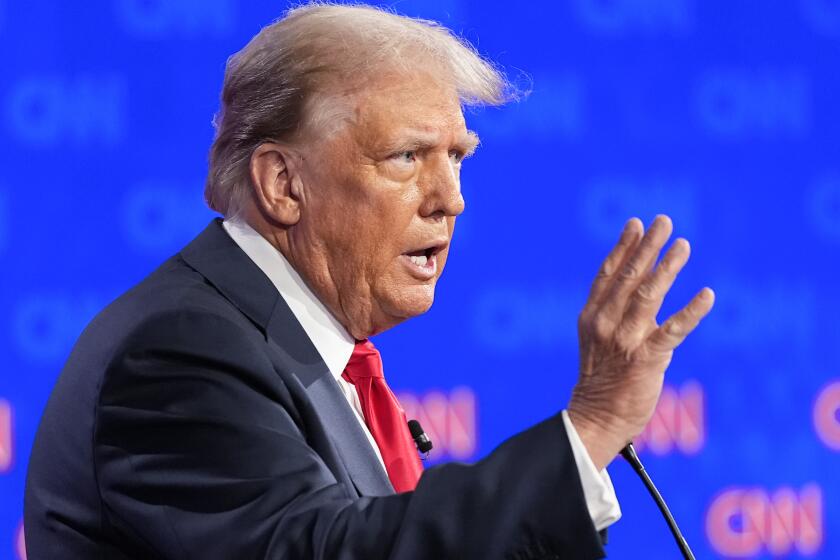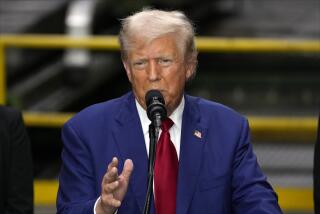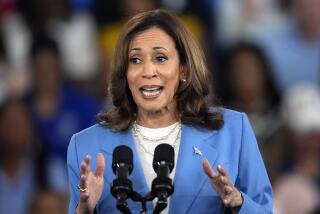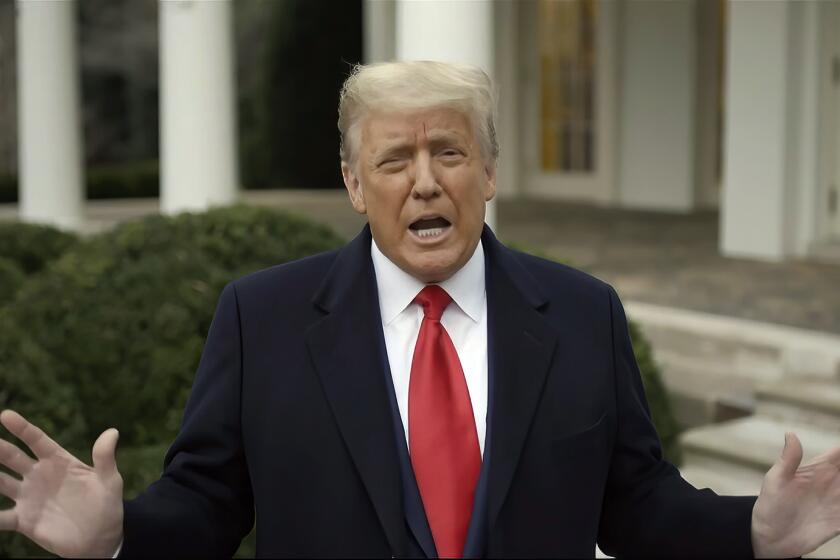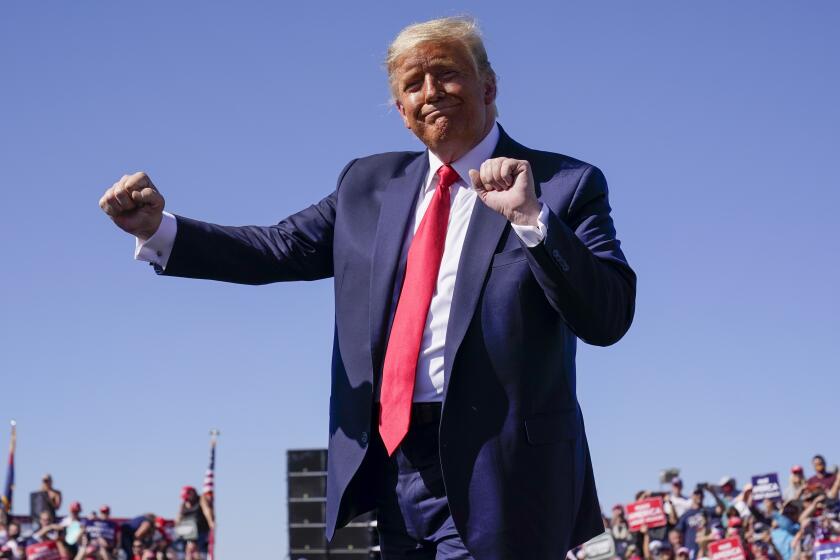Trump says he’ll boost the economy by cutting federal spending and corporate taxes
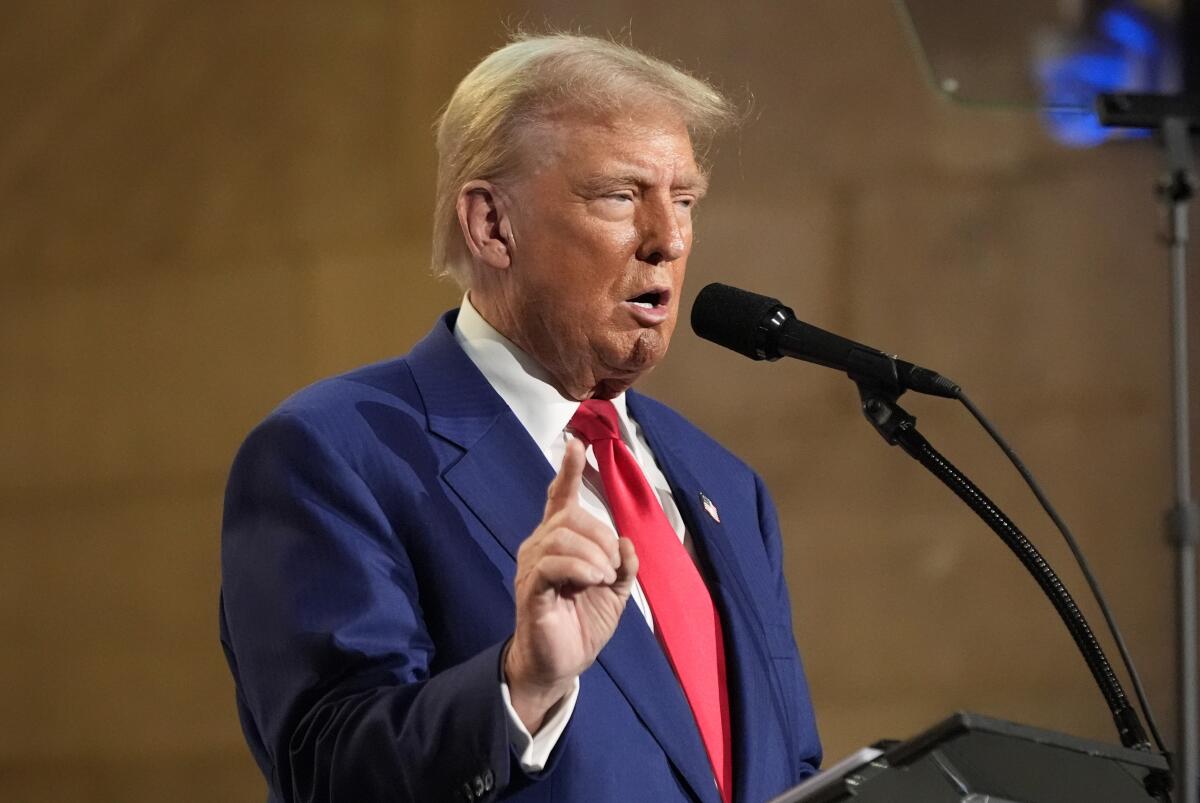
Former President Trump told a group of executives and industry leaders on Thursday that he wants to lead a “national economic renaissance” by slashing regulations to boost energy production, embracing cryptocurrencies and drastically cutting government spending as well as corporate taxes for companies that produce in the United States.
The Republican presidential nominee, speaking to the Economic Club of New York, said he would immediately issue a national emergency declaration to achieve a massive increase in the domestic energy supply and eliminate 10 current regulations for every new regulation that the government adopts. He said Tesla and Space X Chief Executive Elon Musk has agreed to head a commission to perform a financial audit of the federal government that would save trillions of dollars. “My plan will rapidly defeat inflation, quickly bring down prices and reignite explosive economic growth,” Trump claimed.
Trump spoke to the same group eight years ago, and on Thursday he touted his economic accomplishments while in office, including jobs created on his watch, cuts on taxes and regulations, and his efforts to renegotiate trade deals.
His visit came a day after appearing in a town hall on Fox News, where he argued that his Democratic opponent, Vice President Kamala Harris, would drive large companies away from the U.S. if she wins the election.
Vice President Kamala Harris has used a New Hampshire campaign stop to propose an expansion of tax incentives for small businesses.
Trump has previously floated the idea of chopping the 21% corporate tax rate to 15%, but on Thursday clarified that would be solely for companies that produce in the United States. The corporate rate had been 35% when he became president in 2017, and he later signed a bill lowering it. Trump has also proposed not to tax tips or Social Security income.
Trump and Harris want to take the rate in opposite directions while arguing that each is better than the other for American business. It’s one of the many ways the two major-party nominees have laid out sharply different views on the economy, a critical issue in this year’s election.
Trump had a slight advantage over Harris on which candidate would better handle the economy, according to an AP-NORC poll conducted in August. Some 45% of adults said Trump would do a better job, and 38% said Harris.
Harris calls for raising the corporate tax rate to 28% from 21%. Her policy proposals this week have been geared toward promoting more entrepreneurship, a bet that making it easier to start new companies will increase middle-class prosperity.
Economists have warned about Trump’s plans to impose tariffs that he says would return manufacturing jobs to the United States. Some have said such taxes on imports could worsen inflation, though he is vowing to cut down costs. Inflation peaked in 2022 at 9.1% but had eased to 2.9% as of last month.
Trump’s debate technique involves burying opponents with so many falsehoods and outlandish statements that they don’t have time to respond.
“Some might say it’s economic nationalism. I call it common sense. I call it America First,” he said on Thursday.
President Biden’s administration preserved the tariffs on China introduced under the Trump administration and banned exports of advanced computer chips to China.
Harris favors a top capital gains rate of 28%, whereas Biden has wanted to nearly double the existing rate to 39.6% on investors making more than $1 million. Both also want to increase a separate tax rate on investment income.
On Thursday, Trump attacked Harris’ proposals on banning price gouging and accused her of embracing Marxism and communism.
“She wants four more years to enforce the radical left agenda that poses a fundamental threat to the prosperity of every American family and America itself,” he said.
In New Hampshire on Wednesday, Harris called for expanding tax deductions tied to the expenses of starting a business and set a goal of 25 million applications to form new companies over the next four years.
Colvin, Gomez Licon and Boak write for the Associated Press. AP writer Amelia Thomson-DeVeaux contributed to this report.
More to Read
Get the L.A. Times Politics newsletter
Deeply reported insights into legislation, politics and policy from Sacramento, Washington and beyond. In your inbox three times per week.
You may occasionally receive promotional content from the Los Angeles Times.

